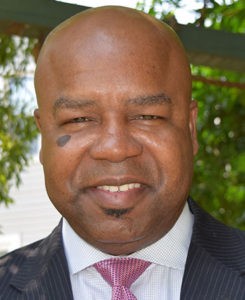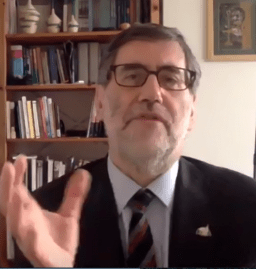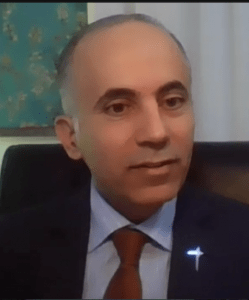Easter is the high point of the Christian calendar, ending a period starting with Christmastime celebrations of Jesus’ birth through Lent to the resurrection on Easter Sunday. The Lenten season is a time for quiet and thoughtful reflection about Christ’s life and sacrifice, his role as a peacemaker between God and humankind.
An event hosted by the Institute for Global Engagement at the beginning of this season focused on the role of Christian peacemakers at home and abroad. IGE brought together panelists from around the world for a conversation framed by Jesus’ Sermon on the Mount: “Blessed are the peacemakers.”
The four speakers brought a variety of perspectives. The discussion included Johnny Hill, dean of Shaw University’s School of Divinity; Christy Anastas, IGE Center for Women, Faith and Leadership fellow and founder of the Israeli-Palestinian I-61 Collective; Father Fadi Daou, founder of the Lebanese peace organization Adyan Foundation; and Andrea Bartoli of the Catholic lay organization Sant’Egidio Foundation for Peace and Dialogue. They represented differing expressions of Christianity hailing from different parts of the world and thus brought their own unique perspectives to the topic.

Johnny Hill
The conversation began by asking how Christians can be peacemakers on a local and international level. Hill stressed how the global community is deeply connected to the work of local communities. He pointed to the anti-apartheid struggle in South Africa, saying divestment helped dismantle the system of apartheid.
“We have to be very aware of how our choices on a personal and local level can impact, collectively, the lives of people all around the world,” he said, concluding that whatever the action, “we must ground our theology in human suffering.”
Daou suggested that those engaging in peace must engage politically and adopt universal causes: “We can’t build peace for people against others. Peace is always built with others and for all mankind.” He emphasized the importance of having a godly mindset, saying in this work, believers must “stay guided by spiritual values, because even when we engage ourselves as peacemakers, we can be misled by the struggle itself.”

Andrea Bartoli
Bartoli recommended starting in prayer, pointing to Jesus’ example. Adding to Hill’s advice of a theological grounding, he said, “Peace has something to do with meaning and something to do with giving meaning to a moment that seems to be completely absurd, that the suffering … must become the foundation of our theology because we are called to understand life as life is and not as we pretend it to be.”
The conversation turned to relationships in different contexts and ways to go beyond to build peace. The panelists agreed that a personal encounter with the suffering is the best way to build relationships.
“The gospel starts with visits, people visiting Jesus in Bethlehem, and even before that, Mary visiting Elizabeth,” Bartoli explained. “It doesn’t say that you need to make sure that those who are hungry will never be hungry again, or that those who are imprisoned will never be prisoners again, or those who are sick will never be sick again. What the Lord is asking us is just to visit.”

Christy Anastas
Anastas agreed based on her experience as a Palestinian Christian growing up in Bethlehem: “Working on a grassroots level is crucial alongside working top to bottom as well. They need to align. The work needs to be together. You can’t just work on a grassroots level and leave the politics untouched; I think both are necessary at the same time.”
The conversation then turned toward the importance of encountering others and being present in their spaces. Hill introduced the concept of “ubuntu,” an African tradition that emphasizes common humanity and oneness. For Hill, ubuntu can be incorporated into the Christian call for peacemaking. He also emphasized the need for storytelling through technology to interact and build peace globally.

Fadi Daou
Daou and Bartoli noted the danger of technology, however. Daou said: “There is a fine line between making people stars or making people models to incite others to become peacemakers. So I think we need to use the technology we have today. We need to use communication, but at the same time not to look for superficial fame but to encourage others that they can build peace wherever they are.”
A member of the audience raised a question on how ubuntu could reach a victimized group to a perpetrator group.
Hill answered that relationships are the basis for constructing meaning globally, but he recognizes the challenge in doing so, especially in the American context of white supremacy and Christianity. Inspired by the leadership of Martin Luther King Jr., he said, “I think it’s important for Christians to acknowledge history and that we have to continue to educate ourselves, lean into the discomfort of being willing to not only address our own participation in systems of inequity, but also being willing to fight, not just pray, but also pray and struggle and fight through peaceful means to address that work.”
Peace is not like “an American suburb” but is “a reality that comes true in the Cross, through the Cross, for us in a person that is able to love until the end.”
Anastas spoke about the challenges of peacemaking during the Intifada, trying to bridge divides between Muslims and Jews, which made her family a target from both sides. From those difficult experiences, she became “very passionate about trying to advocate that the worldwide church plays a crucial role (in) trying to bring both sides together.” But peace work is hard, she added. While trying to bring both sides together, “I was met with a lot of resistance from Christians.”
In closing, the four practitioners agreed that Christians have an obligation to lead in the hard work of peacemaking. And when doing so, they agreed that Christians need a spiritual framework of humility and human fraternity.
Bartoli challenged everyone to internalize the importance of Jesus’ statement, “Blessed are the peacemakers.” He said peace is not like “an American suburb” but is “a reality that comes true in the Cross, through the Cross, for us in a person that is able to love until the end.”
Knox Thames is a senior fellow at the Institute for Global Engagement. Thanh Nguyen is an IGE research assistant.


